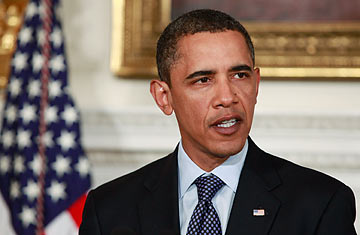
President Obama speaks about the attempted terrorist attack on a U.S.-bound flight that took place on Christmas Day
Throughout his Administration's investigation of the intelligence failures that allowed an alleged terrorist to board and almost bomb a Christmas Day flight bound for Detroit, President Obama has tried to strike a delicate balance between stressing accountability and resisting the urge to point fingers.
On Thursday in the State Dining Room, as he briefly discussed the findings of the probe, the President promised to hold his staff "accountable when they fail to perform their responsibilities at the highest levels." But then, a moment later, he added, "I am less interested in passing out blame than I am in learning from and correcting these mistakes to make us safer." He announced no demotions or discipline for anyone, while taking personal responsibility for the oversights. "When the system fails, it is my responsibility," he said.
His top counterterrorism adviser, John Brennan, suggested in a briefing afterward that there was little direct blame to be apportioned. "This was not the failure of a single individual or a single organization," Brennan said, calling the failures "systemic." But a moment later, White House spokesman Robert Gibbs suggested that such discipline — which he termed corrective action — may still be forthcoming. Explaining that Thursday's release focused narrowly on implementing the preliminary review, Gibbs said, "We don't have any announcements other than that today."
So who still has reason to be worried about their jobs? The preliminary, declassified findings of the President's investigation that were released point to several rather specific failures by both agencies and individuals in the counterterrorism community.
• According to the report, intelligence-community leadership, presumably including top brass Leon Panetta at the CIA, Michael Leiter at the National Counterterrorism Center (NCTC) and Dennis Blair at the office of the Director of National Intelligence, "did not increase analytic resources" to address the threat of al-Qaeda in the Arabian Peninsula (AQAP), even after it became clear that the group was planning attacks on U.S. targets.
• The report found that the "all-source analysts" at the CIA and NCTC had enough information to disrupt the attack, but the dots were never connected. "[In] both cases, the mission to 'connect the dots' did not produce the result that, in hindsight, it could have," it said. In the analysts' defense, the report notes that the information "was fragmentary and embedded in a large volume of other data."
• The report suggests that these analysts were not being tasked properly, given the known effort by AQAP to attack the U.S. homeland. "Analytic focus during December was on the imminent AQAP attacks on American and American interests in Yemen, and on supporting [counterterrorism] efforts in Yemen," the report reads.
• The report blames both the White House and the national-security staff for failing to identify the possibility that analysts would miss such crucial information. In a statement to the press after the President spoke, Brennan, who leads counterterrorism efforts at the White House and conducted the probe himself, seemed to take responsibility for this part of the failure. "I told the President today, I let him down," Brennan said. "I am the President's assistant for homeland security and counterterrorism. And I told him that I will do better, and we will do better as a team."
• The report finds that personnel at the NCTC and CIA who are responsible for creating terrorist watch lists "did not search all available databases to uncover additional derogatory information that could have been correlated" with the suspected bomber, Umar Farouk Abdulmutallab. As a result, he was never placed on a watch list that would have prevented him from boarding the plane to Detroit.
• The report notes that Abdulmutallab's name was misspelled in one of the government databases, leading the State Department to falsely believe that he lacked a valid U.S. visa. The report does not make clear how this misspelling occurred.
• The report notes "delayed dissemination of a finished intelligence report" that might have prevented the attack but again does not attribute the failure to any person or agency.
Other failures — including the limits of technology to allow analysts to correlate the data on Abdulmutallab, as well as a lack of other processes — are also noted in the report, though they are attributed to systemic problems.
Obama issued a series of corrective measures Thursday for agencies across the government, including instructions for the intelligence community to review its procedures, for the State Department to review its handling of visas and for White House staffers to continue their investigations into systemic failures. In the coming weeks and months, the shortcomings that led up to the Christmas Day bombing attempt are sure to be investigated by Congress and perhaps other agencies — including the inspectors general who oversee the intelligence community. Those inquiries may do more to single out individuals who failed to do their jobs, if the President's own continuing investigation does not call them out first.
